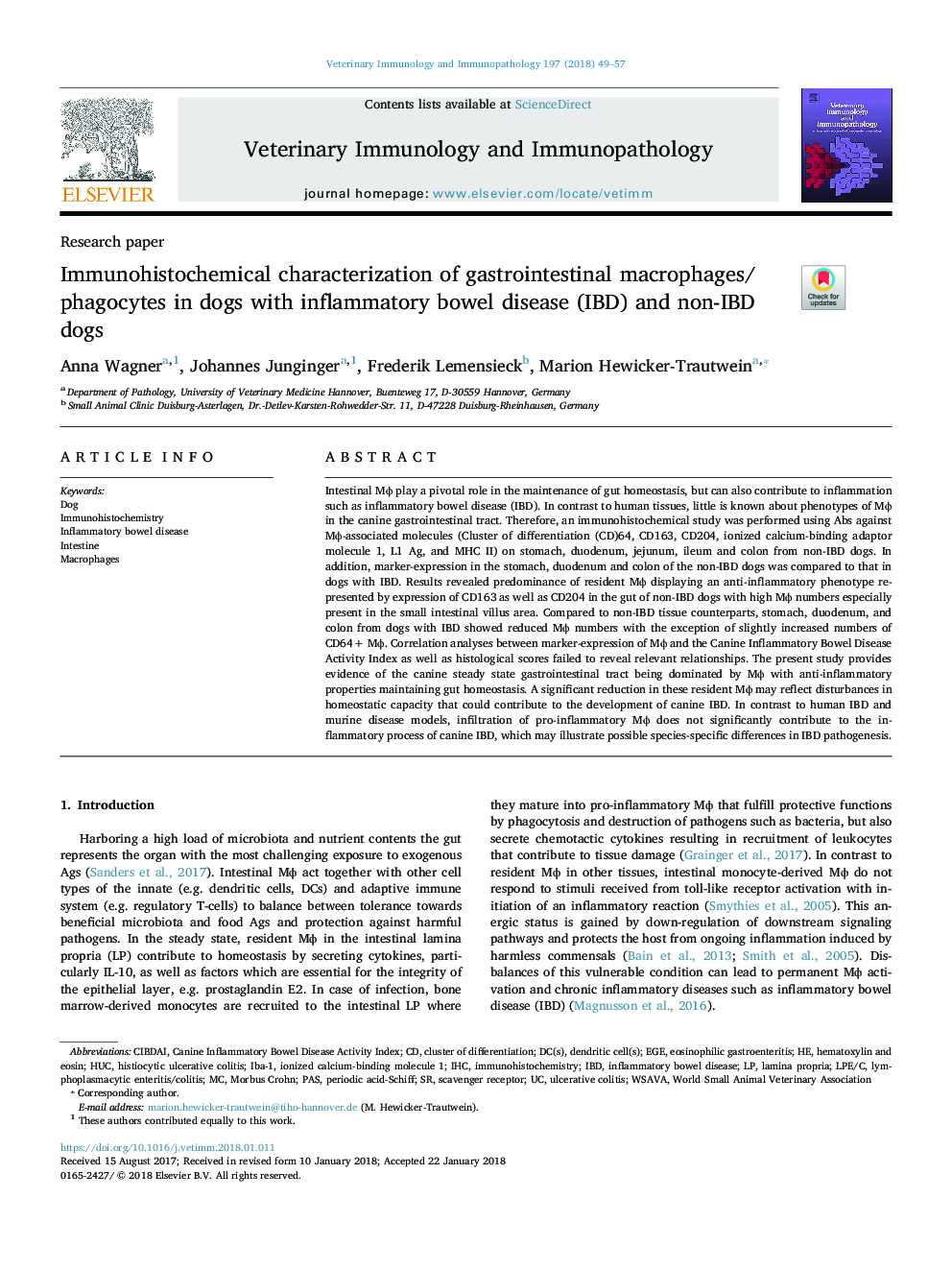| کد مقاله | کد نشریه | سال انتشار | مقاله انگلیسی | نسخه تمام متن |
|---|---|---|---|---|
| 8504745 | 1554988 | 2018 | 9 صفحه PDF | دانلود رایگان |
عنوان انگلیسی مقاله ISI
Immunohistochemical characterization of gastrointestinal macrophages/phagocytes in dogs with inflammatory bowel disease (IBD) and non-IBD dogs
دانلود مقاله + سفارش ترجمه
دانلود مقاله ISI انگلیسی
رایگان برای ایرانیان
کلمات کلیدی
IBDDC(s)Morbus CrohnHUCEGEIba-1 - IBA-1periodic acid-Schiff - اسید فسفریک SchiffImmunohistochemistry - ایمونوهیستوشیمیIHC - ایمونوهیستوشیمیInflammatory bowel disease - بیماریهای التهابی رودهcluster of differentiation - خوشه تمایزIntestine - رودهdendritic cell(s) - سلولهای دندریتیکDog - سگLamina propria - لامینا پروپریاMacrophages - ماکروفاژها،درشت خوارهاPAS - نهHematoxylin and Eosin - هماتوکسیلین و ائوزینUlcerative colitis - کولیت اولسراتیوEosinophilic gastroenteritis - گاستروانتریت ائوزینوفیلیScavenger receptor - گیرنده مخرب
موضوعات مرتبط
علوم زیستی و بیوفناوری
علوم کشاورزی و بیولوژیک
علوم دامی و جانورشناسی
پیش نمایش صفحه اول مقاله

چکیده انگلیسی
Intestinal MÏ play a pivotal role in the maintenance of gut homeostasis, but can also contribute to inflammation such as inflammatory bowel disease (IBD). In contrast to human tissues, little is known about phenotypes of MÏ in the canine gastrointestinal tract. Therefore, an immunohistochemical study was performed using Abs against MÏ-associated molecules (Cluster of differentiation (CD)64, CD163, CD204, ionized calcium-binding adaptor molecule 1, L1 Ag, and MHC II) on stomach, duodenum, jejunum, ileum and colon from non-IBD dogs. In addition, marker-expression in the stomach, duodenum and colon of the non-IBD dogs was compared to that in dogs with IBD. Results revealed predominance of resident MÏ displaying an anti-inflammatory phenotype represented by expression of CD163 as well as CD204 in the gut of non-IBD dogs with high MÏ numbers especially present in the small intestinal villus area. Compared to non-IBD tissue counterparts, stomach, duodenum, and colon from dogs with IBD showed reduced MÏ numbers with the exception of slightly increased numbers of CD64+ MÏ. Correlation analyses between marker-expression of MÏ and the Canine Inflammatory Bowel Disease Activity Index as well as histological scores failed to reveal relevant relationships. The present study provides evidence of the canine steady state gastrointestinal tract being dominated by MÏ with anti-inflammatory properties maintaining gut homeostasis. A significant reduction in these resident MÏ may reflect disturbances in homeostatic capacity that could contribute to the development of canine IBD. In contrast to human IBD and murine disease models, infiltration of pro-inflammatory MÏ does not significantly contribute to the inflammatory process of canine IBD, which may illustrate possible species-specific differences in IBD pathogenesis.
ناشر
Database: Elsevier - ScienceDirect (ساینس دایرکت)
Journal: Veterinary Immunology and Immunopathology - Volume 197, March 2018, Pages 49-57
Journal: Veterinary Immunology and Immunopathology - Volume 197, March 2018, Pages 49-57
نویسندگان
Anna Wagner, Johannes Junginger, Frederik Lemensieck, Marion Hewicker-Trautwein,